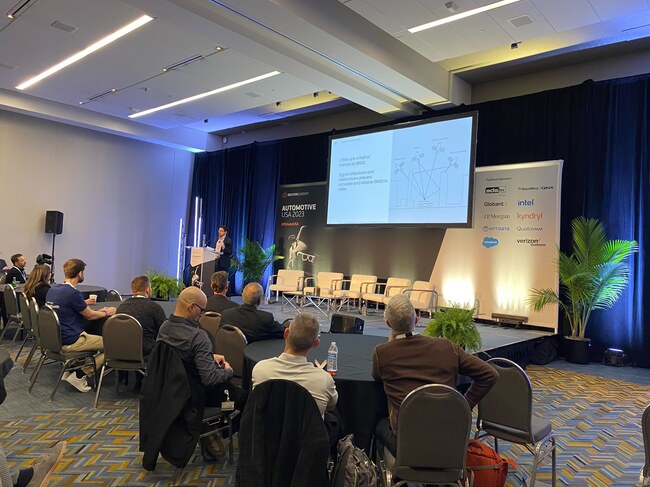5 core conversations shaping the automotive industry
Ramya Sriram
5 min read
21st Nov, 2023
Automotive

Participating in the AutonomousUSA agenda was a fantastic experience, delving into a myriad of challenges confronting the industry, spanning strategy, partnerships, safety, software, technology, and beyond.
Given that contemporary cars are essentially an extension of smartphones, the evolution in OEM business models, including broader ecosystems and partnerships, is paramount.
The conference encompassed several key themes – our GNSS expert, Manuel del Castillo has shared his insights around 5 topics of interest.
Digital transformation
A predominant theme for the event was of course digital transformation. The integration of digital technologies is fundamentally changing the way the industry operates from engagement to safety and security. This transformation is evident across various domains, ranging from manufacturing to the overall customer experience. While connectivity advancements enhance features like over-the-air updates and real-time data monitoring, the industry faces ongoing challenges in establishing robust cybersecurity measures. Additionally, the digitisation of the sector introduces further hurdles, such as the complexities of integrating legacy systems with digital technologies and the essential requirement for the right skills and expertise to maintain the momentum of this transformative process.
Autonomous driving
The ongoing development and testing of autonomous or self-driving vehicles remain key focuses in the industry. Whilst some companies are exploring enhancements to their advanced driver-assistance systems, some are working on fully autonomous vehicles for the future. The potential benefits, such as heightened safety and innovative business models discussed by the panel, add to the significance of these efforts.
The agenda extensively addressed the technical challenges associated with creating dependable sensor technologies capable of navigating diverse driving conditions and environments. Concurrently, discussions delved into the challenges related to gaining public acceptance of this transformative technology.
Our own talk within the agenda focused on the role of GNSS as a key unique sensor responsible for road maps georeferencing, lane determination and navigation and on the road maps. New cost effective innovations, such as S-GNSS Auto are working towards extending ADAS into urban environments through software that can run either on the GNSS chip or the operating system, and provide automakers with a scalable upgrade to their ADAS and hands free systems.
Collaboration
The importance of collaboration across the ecosystem was a thread that connected all aspects of the agenda. The innovation challenges associated with developing autonomous vehicles, enhancing safety critical features and improving fuel efficiency requires an integration of expertise and resources that tackle these challenges together. As consumer preference and regulatory pressure drive sustainability in the market, the shift toward mobility-as-a-service (MaaS) models are gaining popularity. Motional is the AV technology provider of choice for the ride-hail industry and discussed the effectiveness of their partnership strategy which is thriving with Lyft, Uber and Uber Eats.
Industry collaborations are enhancing supply chain resilience, improving economies of scale, whilst reducing overall costs of production. The benefits in the talks were clear, with evolving shifts in consumer preferences, regulatory changes, and advancements in technology – collaboration can only enhance the industry’s ability to adapt quickly and cope with the fast market changes.
Electrification
As the push toward electric vehicles continues to gain momentum, many major automakers have been investing heavily in the development of electric cars, with an increasing focus on expanding charging infrastructure. A representative from Volkswagen of America, Inc shared how they are vertically integrating battery production to help bring down costs for customers. There is also an increasing emphasis on sustainability, with automakers working to reduce their environmental footprint. This involves not only developing electric vehicles but also implementing more eco-friendly manufacturing processes.
Cyber-security
It was interesting to note that whilst cyber-security remains one of the key concerns facing the sector today, content was light regarding robust security measures across the entire ecosystem. The sector is grappling with intricate and evolving regulatory compliance issues in various areas, including safety, data management and emissions – each presenting its own set of challenges. Governments are continually updating safety standards, encouraging the adoption of advanced safety technologies in new vehicles and as vehicles become more connected there remain significant challenges associated with the collection, storage and protection of data generated by smart vehicles. In our industry poll, we found a general awareness of GPS spoofing, but mitigation strategies may not be at the forefront of most participants’ minds. Those we engaged with unanimously emphasised the industry’s responsibility to educate and alleviate consumer fears.
Just like the importance of collaboration across the automotive ecosystem, it was great to have been able to have an active involvement in this thriving industry event – playing our part to help overcome industry challenges, and drive innovation, safety and compliance across the industry.







